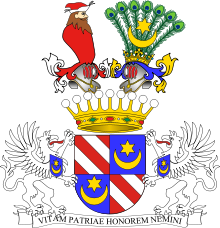Emeryk August Hutten-Czapski
Emeryk August, Count Hutten-Czapski (born 21 August 1897 in Stankow, Minsk Governorate, died 31 January 1979 in Rome, Italy),[1] was a Polish aristocrat, politician, military officer, diplomat and Bailiff of the Polish Sovereign Military Order of Malta.
Emeryk August Hutten-Czapski, descended from a long line of nobles who contributed much to Poland's political and cultural life.
Emeryk was adopted by a second cousin twice removed, Count Bogdan Hutten-Czapski, who had no issue, was very wealthy, and was a prominent and controversial figure in Polish politics.
In 1919 he worked for the Hoover Food Mission of the American Relief Administration in Warsaw, and in 1920 he was placed in charge of the religious and ethnic affairs of Minsk.
When the Russians invaded Poland on September 17, 1939, Hutten-Czapski fled to France, and worked with the Polish Government in Angers.
[10][15] In 1944 he was promoted to lieutenant colonel in the army, and transferred as political adviser, to the Supreme Headquarters Allied Expeditionary Force.
[16] In 1945 he was embedded with the 2nd Regiment of the 1st Armoured Division (Poland) under the command of general Stanisław Maczek which fought in the Falaise Pocket and crossed the Rhine into Germany.
[17] He was part of the patrol that liberated the Polish women of the Home Army who had fought in the Warsaw Uprising, and were interned in the Oberlangen prison camp.
[18] He visited the Dachau, and the Mauthausen-Gusen concentration camps, and informed the Cardinal Primate, August Hlond, of the clergy that had survived.
[19][20][21] He was named delegate to General Władysław Anders High Commission[10] of the II Corps (Poland) in Italy, and when the war ended he settled in Rome.

